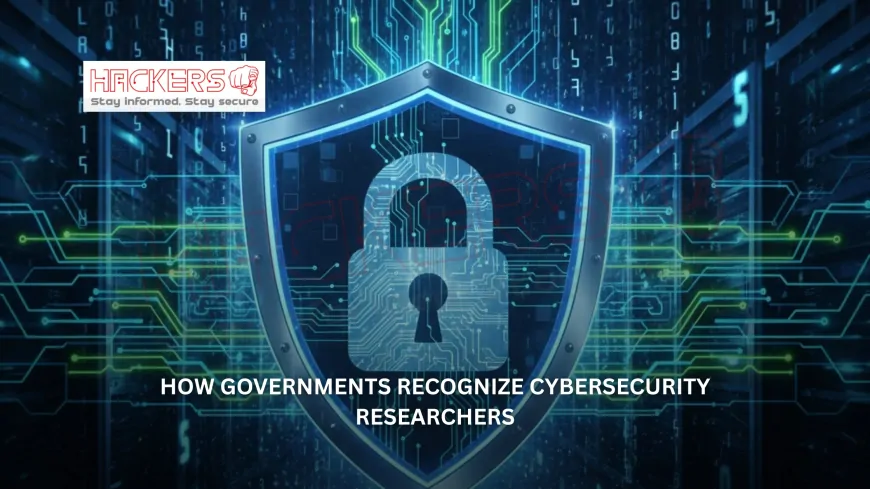How National Governments Honor Cybersecurity Researchers
Imagine finding a hidden door in the digital walls that protect a nation’s most sensitive systems. Now imagine that instead of exploiting it, you report it responsibly and help close the gap before harm is done. This is the quiet heroism of cybersecurity researchers. Around the world, governments are increasingly recognizing these unsung guardians with formal honors, awards, financial rewards, and public gratitude. These gestures do more than celebrate skill. They encourage ethical discovery, strengthen national security, and build trust between hackers and authorities. In this blog, we explore how countries honor the people who keep their digital borders safe.

Table of Contents
- Why Governments Recognize Cybersecurity Researchers
- Types of Government Honors and Awards
- Notable National Recognition Programs
- How Researchers Earn Government Recognition
- The Role of Bug Bounties and Responsible Disclosure
- Challenges in Government Recognition
- Global Trends and Future Outlook
- Conclusion
- Frequently Asked Questions
Why Governments Recognize Cybersecurity Researchers
Cybersecurity is a national security priority. A single vulnerability in critical infrastructure, such as power grids, financial systems, or defense networks, can cause widespread disruption. Researchers who uncover these flaws before attackers do are vital assets.
Governments honor them for several reasons:
- Encouraging Ethical Behavior: Public praise rewards responsible disclosure instead of selling flaws on the black market.
- Building Talent Pipelines: Recognition attracts young professionals to public service roles in cybersecurity.
- Strengthening Defenses: Fixed vulnerabilities mean fewer successful cyberattacks on government systems.
- Improving Public Trust: Transparency about flaws and fixes shows accountability.
When a researcher helps patch a flaw in voter registration software or military communication tools, the impact is real and measurable. Governments want more of that.
Types of Government Honors and Awards
Recognition comes in various forms, from ceremonial to financial. Here are the most common:
- Certificates and Letters of Appreciation: Signed by ministers, presidents, or agency heads.
- Cash Rewards and Bug Bounties: Payments for valid, high-impact vulnerability reports.
- Public Awards and Medals: Given at national cybersecurity conferences or independence day events.
- Invitations to Closed Briefings: Researchers join discussions with defense and intelligence officials.
- Fast-Track Security Clearances: Helps researchers contribute to sensitive projects.
- Scholarships and Training Grants: Especially for students and early-career professionals.
These honors vary by country, budget, and political culture. Some nations prefer quiet gratitude. Others make it a public celebration.
Notable National Recognition Programs
Several countries lead in formalizing researcher recognition. The table below highlights five standout programs.
| Country | Program Name | Type of Honor | Year Launched | Notable Feature |
|---|---|---|---|---|
| United States | CISA Researcher Recognition | Letters, public thanks, bounties | 2019 | Partners with HackerOne for DoD systems |
| Singapore | SG Cyber Youth Award | Medals, cash, scholarships | 2017 | Targets students under 25 |
| Netherlands | NCSC Responsible Disclosure Honor Roll | Public listing, certificates | 2015 | Names top reporters annually |
| Israel | IDF Unit 8200 Excellence Award | Medals, career advancement | 2018 | Given to civilian researchers aiding defense |
| Australia | ASD Cyber Researcher Commendation | Certificates, invitations | 2020 | Includes joint exercises with reporters |
These programs show diversity in approach. The U.S. leans on financial incentives. Singapore invests in youth. The Netherlands values transparency with public lists.
How Researchers Earn Government Recognition
Earning a government honor is not random. Most follow a clear path:
- Responsible Disclosure: Report the flaw privately to the affected agency with clear steps to reproduce it.
- Allow Time to Fix: Give officials 90 to 180 days before public disclosure, unless risk is imminent.
- Provide Proof: Include logs, screenshots, or code samples. Vague reports are ignored.
- Follow Policy: Many agencies publish vulnerability disclosure policies (VDPs) on their websites.
- Avoid Harm: Do not access real user data or disrupt services during testing.
Researchers who follow these steps build credibility. Repeated helpful reports often lead to stronger relationships and bigger honors.
The Role of Bug Bounties and Responsible Disclosure
Bug bounties are a structured way governments pay for flaws. Platforms like HackerOne and Bugcrowd manage programs for the U.S. Department of Defense, Singapore’s GovTech, and the European Union.
Responsible disclosure, on the other hand, is non-financial. A researcher emails a flaw to [email protected], the team fixes it, and a thank-you note follows. Both methods feed into recognition programs. High-payout bounties often come with public credit. Consistent disclosure earns a spot on honor rolls.
Example: In 2022, a Dutch researcher found a flaw in a tax portal. He reported it quietly. The government fixed it in two weeks and added his name to the NCSC Honor Roll. No money changed hands, but his reputation grew.
Challenges in Government Recognition
Recognition is not perfect. Several hurdles remain:
- Bureaucracy: Slow response times discourage researchers. Some wait months for acknowledgment.
- Legal Risks: In some countries, unauthorized testing can lead to prosecution, even with good intent.
- Unequal Access: Programs favor researchers in major cities or with government contacts.
- Low Rewards: Government bounties often pay less than private companies. A critical flaw might earn $500 from a ministry but $50,000 from Google.
- Privacy Concerns: Public honors can expose researchers to retaliation from hostile actors.
Despite these, progress is clear. More countries now have safe harbor clauses protecting good-faith researchers.
Global Trends and Future Outlook
Recognition is spreading. In 2025, India launched its first national bug bounty for election systems. Brazil honored 12 researchers at its annual cyber defense symposium. The United Nations is drafting guidelines to help smaller nations create disclosure policies.
Future trends include:
- Automated Triage: AI tools to quickly validate and reward reports.
- Youth Programs: Coding camps tied to government reporting pathways.
- International Cooperation: Shared bounty pools for cross-border infrastructure like undersea cables.
- Digital Badges: Verifiable credentials on LinkedIn or government portals.
As cyber threats grow, so will the need for trusted researchers. Governments that honor them today are investing in security tomorrow.
Conclusion
Cybersecurity researchers are the scouts of the digital frontier. They find cracks before enemies exploit them. National governments honor these contributors with awards, money, and gratitude because their work directly strengthens public safety. From bug bounties in Singapore to honor rolls in the Netherlands, recognition programs build bridges between independent hackers and state security. Challenges like slow responses and legal fears remain, but the trend is positive. More countries are learning that a thank-you note, a medal, or a modest check can turn a potential critic into a lifelong ally. In an age of relentless cyberattacks, honoring researchers is not just polite. It is essential.
What is responsible disclosure?
It is the practice of privately reporting a security flaw to the owner so they can fix it before public announcement.
Do all governments pay for bug reports?
No. Some offer only public thanks or certificates. Others run paid bounty programs.
Can students receive government honors?
Yes. Many countries have youth awards or scholarships for young researchers.
Is it safe to report flaws to a government?
In countries with clear disclosure policies and safe harbor rules, yes. Always check the policy first.
What is a safe harbor clause?
A legal promise not to prosecute researchers who follow responsible disclosure rules.
How much do government bug bounties pay?
Rewards range from $100 for low-risk issues to $100,000+ for critical flaws in defense systems.
Do researchers need permission to test government systems?
Yes, unless a public bug bounty or disclosure policy explicitly allows testing.
Can foreign researchers be honored?
Yes. Many programs accept reports from anyone, regardless of nationality.
What is CISA in the United States?
The Cybersecurity and Infrastructure Security Agency, which coordinates national cyber defense.
Are honors only for critical infrastructure?
No. Reports on public websites, apps, or internal tools can also earn recognition.
Can a researcher be honored more than once?
Yes. Consistent helpful reports often lead to higher-tier awards or invitations.
Do governments share researcher names publicly?
Only with permission. Many allow anonymous or pseudonymous credit.
What happens after a flaw is reported?
The agency validates it, fixes it, and usually sends thanks or payment within weeks.
Are there awards for teams?
Yes. Some programs honor research groups, CTF teams, or academic labs.
Can reporting a flaw lead to a job?
Often. Agencies invite top reporters to interviews or contractor roles.
Do small countries have recognition programs?
Yes. Estonia, Lithuania, and New Zealand run active disclosure and reward systems.
Is training provided to honored researchers?
Sometimes. Invitations to closed workshops or certification funding are common perks.
Can a report be rejected?
Yes, if it is already known, lacks proof, or violates testing rules.
Are there global standards for researcher honors?
Not yet, but the UN and ISO are working on guidelines for fair recognition.
How can I start reporting to governments?
Find the agency’s vulnerability disclosure policy online and follow its submission steps.
What's Your Reaction?









































































